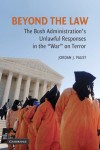The Al-Qaeda Seven controversy is all over the news. At the center of the debate are Justice Department attorneys who once represented terrorism detainees. Maligned by some for being un-American, their patriotism and their values called into question, and defended by others for protecting the liberties of unpopular clients, the story of the Al-Qaeda Seven calls into question the fundamental constitutional boundaries of our government.
 Ultimately, though, these Seven are a conduit for a larger conversation that we need to be having about the prosecution of suspected terrorists: Where should we try members of Al-Qaeda and the Taliban?
Ultimately, though, these Seven are a conduit for a larger conversation that we need to be having about the prosecution of suspected terrorists: Where should we try members of Al-Qaeda and the Taliban?
Jordan J. Paust asks just that in a new op-ed for Jurist: Legal News and Research. With vim, vigor, and vision, he suggests that we must look beyond the two forums offered by the Obama Administration – federal district court or US military commission – to consider a third option: military court-martial.
——–
Via Jurist: FORUM: Op-eds on legal news by law professors and JURIST special guests…
Court-martial: A Third Option for Trying Al Qaeda and Taliban Detainees
JURIST Contributing Editor Jordan Paust of the University of Houston Law Center says regularly constituted military courts-martial could be a plausible third option for federal prosecution of members of al Qaeda and the Taliban outside of federal district courts or US military commissions…..
Where should we be trying members of al Qaeda and the Taliban? Although there has been a great deal of attention to the Obama Administration’s alleged choice between a federal district court and a suspect military commission, there has been no noticeable public discussion of the third forum for federal prosecution of members of al Qaeda and the Taliban and its advantages over military commissions – a military court-martial.
Clearly, trial in a federal district court can be useful for prosecution under various extraterritorial federal laws, such as those that cover murder of U.S. nationals abroad, attempts or conspiracy to kill a U.S. national, and serious bodily injury to a U.S. national under the Antiterrorism Act; anti-hijacking legislation; aircraft sabotage legislation; and any of the federal laws that formed the basis for the indictment in absentia of bin Laden in 2000 in the Southern District of New York. Federal district courts can also be used to prosecute offenses against the laws of war under two sets of federal legislation (1) 10 U.S.C. § 818 (which the Supreme Court has recognized with respect to similar language in its predecessor has incorporated all of the laws of war by reference as offenses against the laws of the United States) coupled with 18 U.S.C. § 3231 (which assures federal district court jurisdiction over all offenses against the laws of the United States), and (2) the War Crimes Act (which merely incorporates some law of war offenses).
Clearly also, prosecution in federal district courts would allow the United States to comply with a number of U.S. obligations under customary and treaty-based international law that the President has a constitutionally-based duty to faithfully execute and that the Supreme Court has already recognized in Hamdan v. Rumsfeld are required under international law, including the need for use of at least minimal due process guarantees under human rights law and applicable laws of war in order to have a fair trial. Fair trials would also serve short and long-term U.S. foreign policy interests and serve fundamental American values that must not be thrown aside.
Federal district court prosecutions would also allow U.S. nationals to avoid criminal and civil liability here and abroad for violations of international law that can pertain with respect to use of present military commissions. It is important to recall in this regard that Article 23(h) in the annex to the 1907 Hague Convention No. IV Respecting the Laws and Customs of War recognizes the customary and treaty-based war crime of declaring “abolished, suspended, or inadmissible in a court of law the rights and actions of the nationals of the hostile party.” Why would the Obama Administration want to set up possible war crime responsibility for military commission judges, military and civilian judges who might review military commission proceedings, and certain members of Congress who had the relevant mens rea when creating the Military Commissions Act? Since international law is a two-way street and can shift with changing patterns of practice and opinio juris, why would the Administration potentially place our soldiers and civilians in harm’s way by approving use of military commissions that simply cannot meet present human rights and law of war standards and might simply be copied in Syria, Iran, or some other country that might obtain jurisdiction over a U.S. national in the future?
Latest Comments
Have your say!